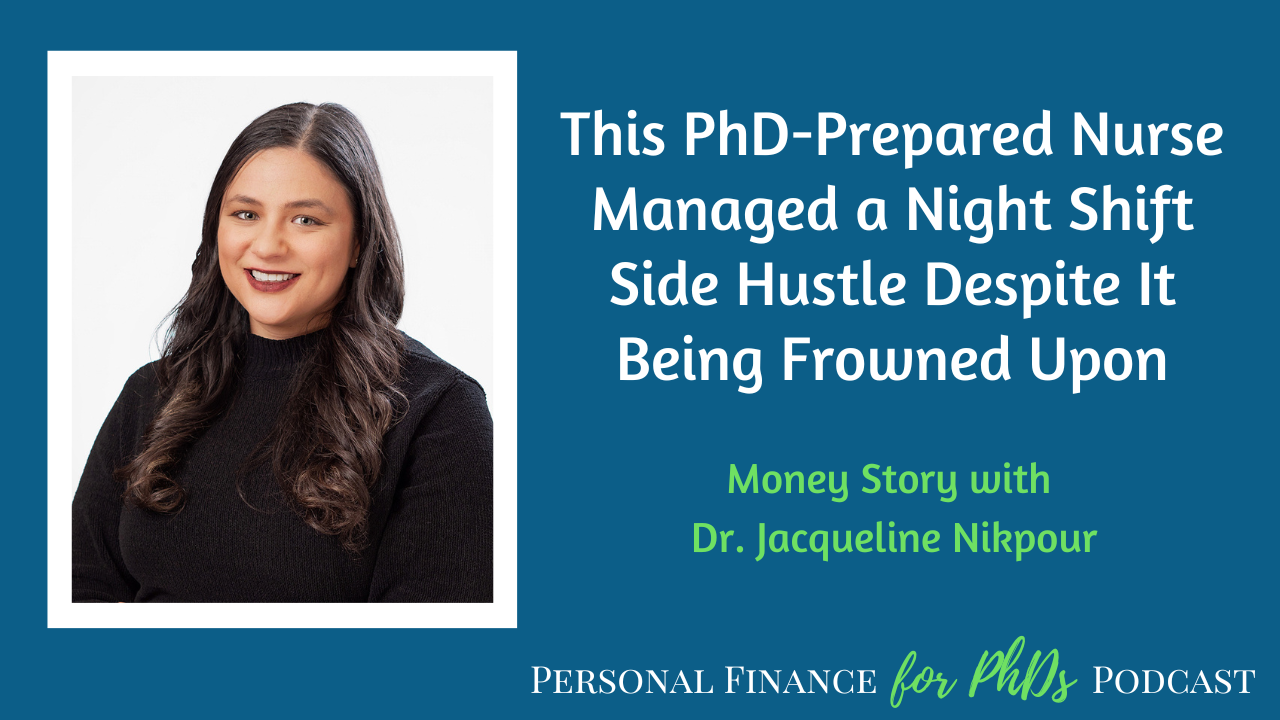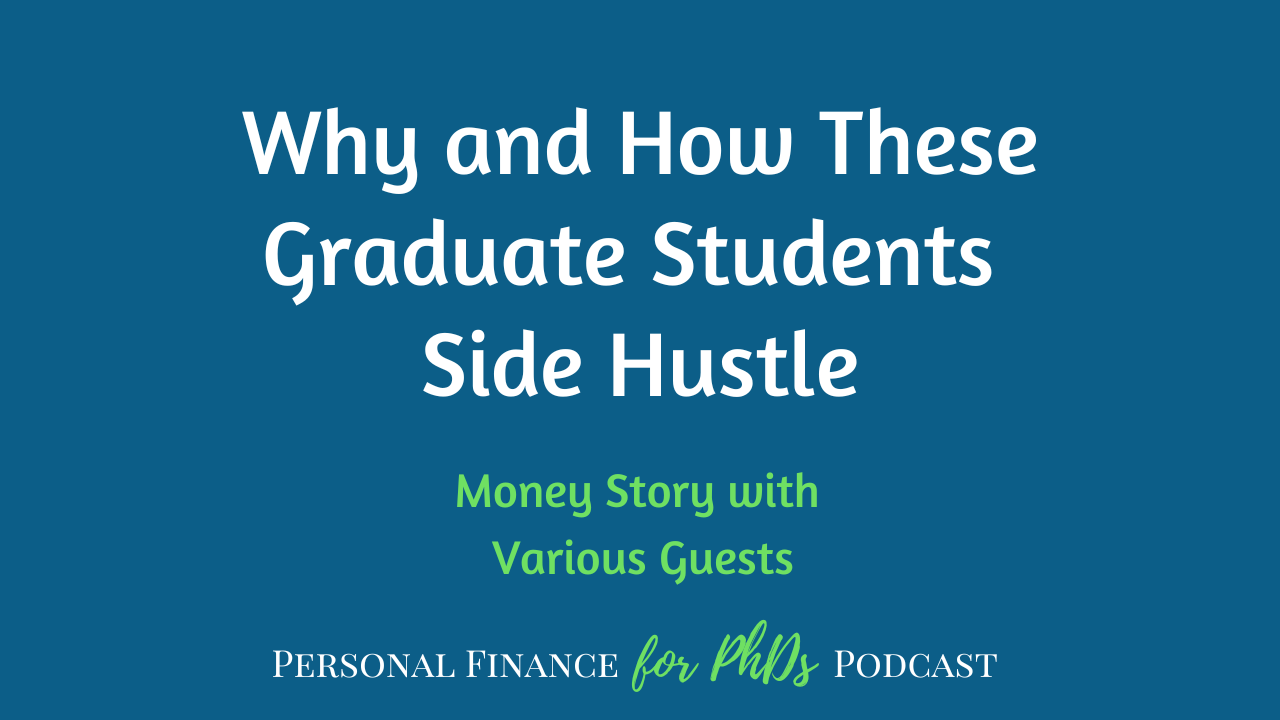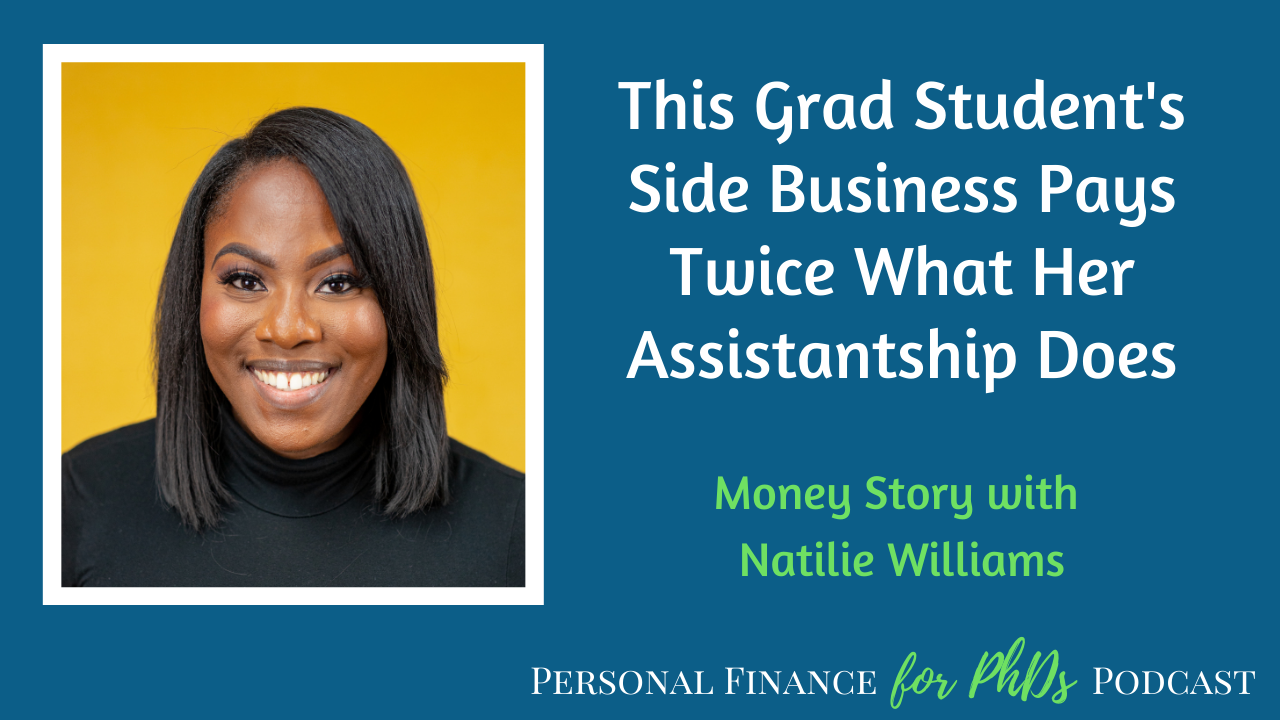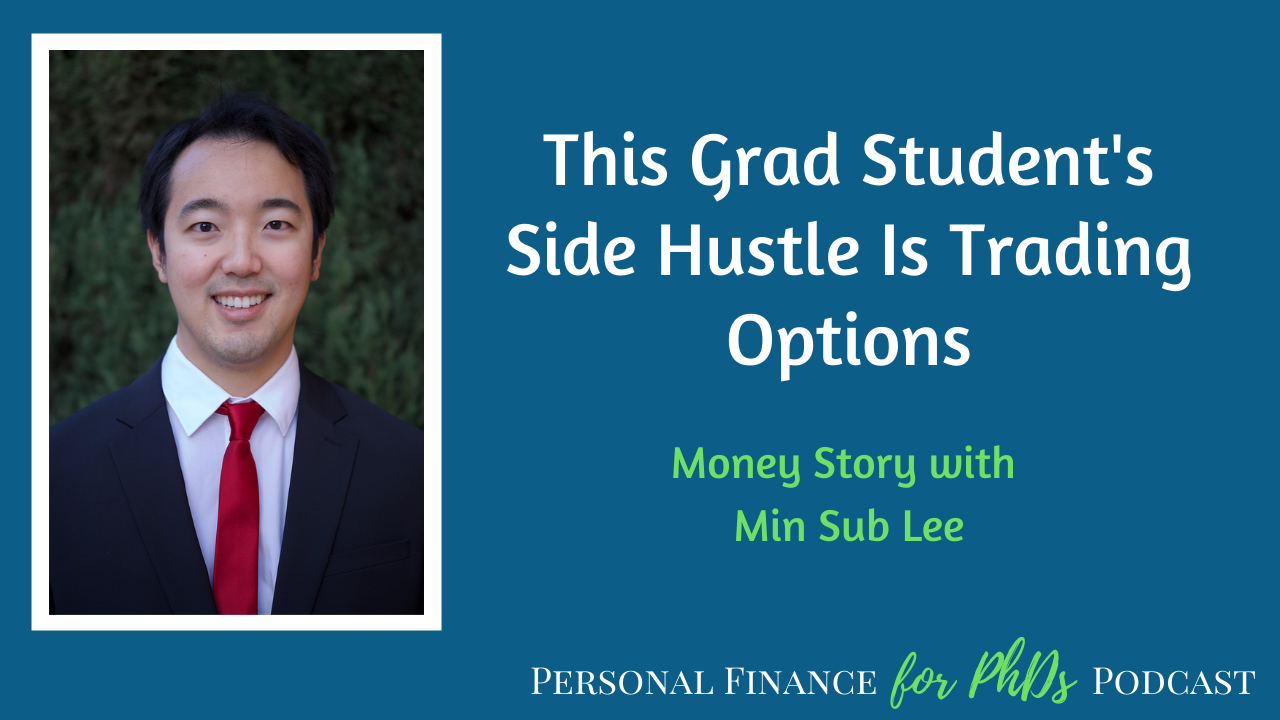In this episode, Emily interviews Alexandria Miller, and 5th-year PhD student in Africana Studies at Brown University. In 2021, Alexandria started a podcast, Strictly Facts: A Guide to Caribbean History and Culture, to further her vision for educational equity. Alexandria participated in a business incubator program at Brown and joined a Caribbean podcast network, and she’s now considering how to transition to podcast into a business, perhaps in the ed tech space. Alexandria and Emily discuss how Alexandria manages her schedule as a grad student and podcaster and whether she is open about her side pursuit within her program.
Links mentioned in the Episode
- Strictly Facts: A Guide to Caribbean History and Culture
- PF for PhDs Subscribe to Mailing List
- Host a PF for PhDs Tax Seminar at Your Institution
- PF for PhDs Podcast Hub
- Strictly Facts Podcast (Twitter)
- Strictly Facts Podcast (Instagram)
- Strictly Facts Podcast (Facebook)
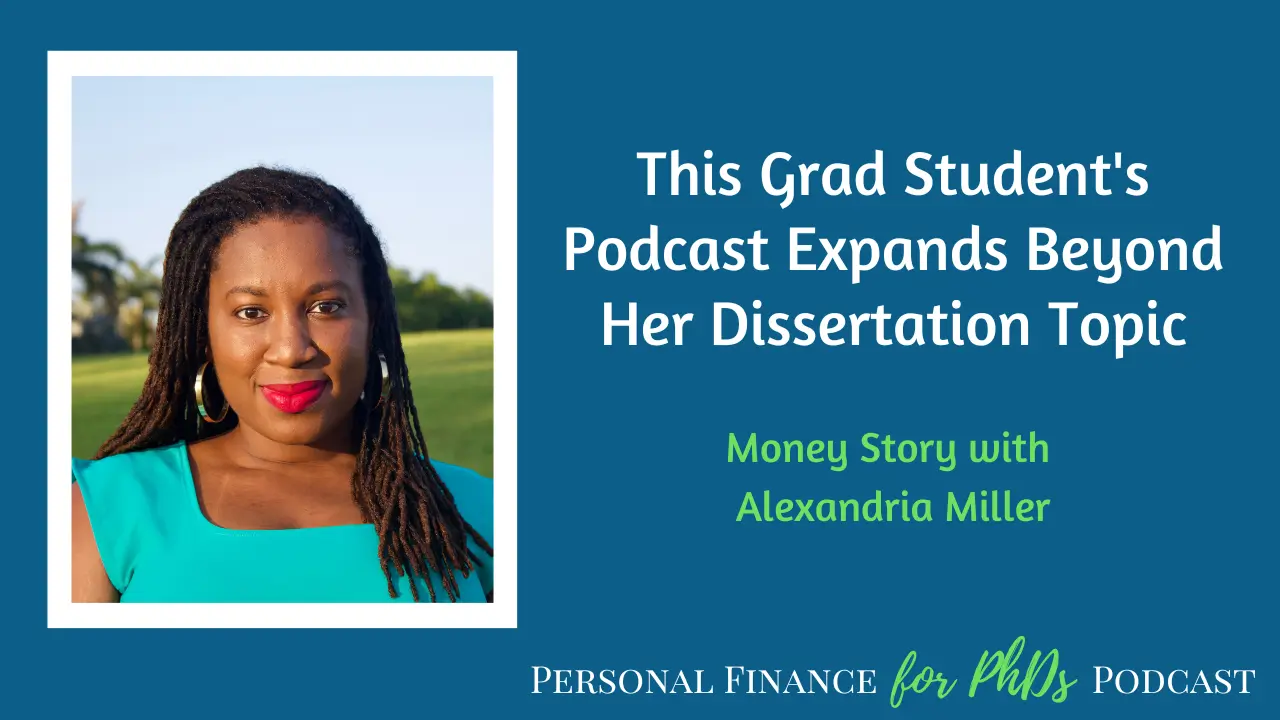
Teaser
Alexandria M (00:00): At first, it started as a podcast in terms of just being a niche interest of mine in a way to bridge conversations with peers and, you know, others who I think are enthusiast of history and maybe are of Caribbean heritage like myself. But I, as time progressed and you know, I’ve been seeing how it’s grown over the last two years, I’ve really started to think about other ways to really make it a side business in itself and not just a hobby.
Introduction
Emily (00:31): Welcome to the Personal Finance for PhDs Podcast: A Higher Education in Personal Finance. This podcast is for PhDs and PhDs-to-be who want to explore the hidden curriculum of finances to learn the best practices for money management, career advancement, and advocacy for yourself and others. I’m your host, Dr. Emily Roberts, a financial educator specializing in early-career PhDs and founder of Personal Finance for PhDs.
Emily (01:03): This is Season 16, Episode 5, and today my guest is Alexandria Miller, a 5th-year PhD student in Africana Studies at Brown University. In 2021, Alexandria started a podcast, Strictly Facts: A Guide to Caribbean History and Culture, to further her vision for educational equity. Alexandria participated in a business incubator program at Brown and joined a Caribbean podcast network, and she’s now considering how to transition the podcast into a business, perhaps in the ed tech space. Alexandria and I discuss how she manages her schedule as a grad student and podcaster and whether she is open about her side pursuit within her program. As I record this introduction, I have just returned from FinCon 2023, which is a conference for financial content creators. It was in New Orleans, and I had a wonderful time and learned a ton! I don’t want to overpromise, but I am hoping to make some changes in the content creation and dissemination aspect of my business, so you can expect some changes like website updates and increased social media content. I’m even toying with the idea of writing a book, which is super scary to say out loud. If you aren’t already on my mailing list, it would be so so helpful to me if you would join so you can hear about all this new and updated content as I’m rolling it out. I would really appreciate the support. As a podcast listener, a great way to get on the mailing list is to go to PFforPhDs.com/advice/ and enter your name and email there. You’ll receive access to a document that contains short summaries of all the answers ever given on the podcast to my final question regarding my guests’ best financial advice. The document is updated with each new episode release. Again, that was PFforPhDs.com/advice/. Thank you so much! You can find the show notes for this episode at PFforPhDs.com/s16e5/. Without further ado, here’s my interview with Alexandria Miller.
Will You Please Introduce Yourself Further?
Emily (03:24): I am delighted to have joining me on the podcast today, Alexandria Miller. She is a fifth year PhD student in Africana studies at Brown, and we’re going to talk about her side business. Really exciting. So Alexandria, thank you so much for joining me on the podcast today, and will you please introduce yourself a little bit further to the audience?
Alexandria M (03:41): Definitely. Thank you so much for having me, Dr. Roberts. It’s a pleasure to share with you, especially having been a listener of your podcast for such a while now. So as you said, I am a fifth year PhD candidate in the Department of Africana Studies at Brown. I did my undergraduate work at Duke University in history in African and African-American Studies, so similar fields nonetheless. And in addition to my work as a PhD candidate and all the things that comes with being a PhD candidate, of course, I also founded Strictly Facts, a Guide to Caribbean History and Culture in 2021. So a little bit over two years now, which is a podcast and educational platform just to expand the knowledge and awareness of the Caribbean and its history and popular culture.
Focus of Graduate Work and Podcasting Side Business
Emily (04:27): Absolutely. And so I wanna know how much overlap there is between like the work you’re doing as grad student, like the subject of your dissertation and what you’re doing with this side business. So can you explain any like similarities or differences between those two?
Alexandria M (04:40): For sure. They are not really similar. To put it simply obviously I am a historian and so my PhD is looking at Jamaican women’s history in the 20th century to contemporary times, but Strictly Facts is just, you know, more expansive in a sense. It covers Caribbean history across the region as well as the diaspora. And so not necessarily pinpointed to my specific project in terms of my dissertation, but definitely there have been crossover conversations in various episodes and things to that nature.
Emily (05:16): But it would be safe to say, is it safe to say that your, your passion or whatever inspired you to choose this as your, you know, undergraduate and graduate field of study is also what is fueling the, the side work, is that right?
Alexandria M (05:29): Definitely. I think I have always loved history and have always been looking for ways to see myself reflected in the history that I was alerting. And I think that in large part inspired my path towards the PhD in becoming a historian. It wasn’t till while in the PhD and especially after some years of work that I’ve done in terms of educational equity and accessibility, that I started also thinking of different ways outside of the classroom potentially to expand accessibility and educational equity. And you know, at first it started as a podcast in terms of just being a niche interest of mine in a way to bridge conversations with peers and, you know, others who I think are enthusiast of history and maybe are of Caribbean heritage like myself. But I, as time progressed and you know, I been seeing how it’s grown over the last two years, I’ve really started to think about other ways to really make it a side business in itself and not just a hobby.
Emily (06:30): And I think this is such an, a natural thing that happens with academics, I would say, especially the faculty level, right? But you’re getting a head start in that by doing it at the grad student level, right? Just the taking their subject matter or something broader than their subject matter and pivoting to a different audience outside that academic sphere. So yeah, I think you’re right in good company a lot of academics do this.
Alexandria M (06:53): I do, I would say so I’ve seen several who, you know, have even pivoted outside of academia into social entrepreneurship and things to that nature. I’m still sort of on the fence in terms of where I’d go because I definitely do love teaching and I am sort of looking forward to figuring out what that shift will look like once I finally finished the dissertation. Of course.
Strictly Facts: A Guide to Caribbean History and Culture Podcast
Emily (07:15): Absolutely. Is there anything else that you’d like to share with us about why you started Strictly Facts?
Alexandria M (07:20): Definitely. I think, you know, as a first generation Jamaican American, there have been several ways that I’ve envisioned just, you know, learning about my heritage and where my family comes from that I think has paralleled amongst and across people from other parts of the region. I have a great network of peers and colleagues who are either from the Caribbean or of Caribbean heritage, and we’ve had several conversations across, you know, not only figuring out ways that our histories have been linked but also there are things that, you know, based off things like national and geographic boundaries, the fact that migration, particularly to the global North, is so high for, for people from the Caribbean. There are just several ways that I think learning of Caribbean history and about Caribbean history could be expanded for those from Caribbean Heritage or from the region. And so that was another impetus for me to start Strictly Facts to really expand these conversations and unify all of the community together a little bit more.
Emily (08:26): And can you tell me more about the, the format of the podcast at least? Like is it an interview-based show? Is it solo episodes?
Alexandria M (08:34): It’s a mix of both, depending on probably how busy I am that week. So I definitely have solo episodes where I share a little bit about a topic and offer listeners, you know, additional resources and books and things for listeners to learn more. But I also have interview style episodes where different experts, enthusiasts of history, people have even came and shared, you know, sort of individual or more familial stories and takes on parts of, you know, how their families or even themselves have been part of Caribbean history. So it is really a fun thing in a sense, which is probably why it started more so as a hobby initially, but I’m definitely looking forward to expanding out Strictly Facts a little bit more beyond its podcast in the years to come.
Emily (09:24): Yeah. So going off that subject a little bit more, tell us about, I guess, the structure that Strictly Facts has taken to this point. What, what steps have you taken with it, and then what might you do in the future going forward?
Alexandria M (09:37): Yeah, so as I said, it was more so of a little bit of a hobby in a sense. And so that just meant, you know, me recording episodes and scheduling things scheduling episodes to record with guests. Since then though, of course I have been looking forward to expanding it out. And so I’ve, I am part of the Caribbean podcast directory, which has been a great resource in terms of just, you know, building the podcast community in a sense, helping me get a little bit more familiar with what that community looks like outside of, you know, getting out of my academic bubble sometimes. But also, you know, whether that be crossover episodes with other podcasters, et cetera. And really just growing my listenership. I have also, in terms of more so like the business angle of things, I was a part of Brown’s Breakthrough Lab or B Lab, which is an entrepreneurship incubator. And that really helped me to shift my framing a little bit of how I thought of Strictly Facts in terms of really considering things like consumers and, you know, where do I wanna take it and sort of the business aim, right? Am I looking towards being a solely content based business? What other ways I am hoping to expand out Strictly Facts. So that has definitely been a great help in terms of shifting towards some of my future aims. Of course though, I always say that I have two babies in a sense, finishing grad school and the dissertation and Strictly Facts. So, trying to graduate is on, is the major goal at the time, but I am looking forward to building out other things in terms of content, you know, educational products, ed tech devices and things to that nature in the future.
Brown’s Breakthrough Lab: Entrepreneurship Incubator
Emily (11:25): Wow, okay. I, I would love to hear a little bit more about this like incubator. ‘Cause this is one of those resources that’s uniquely available when you have a position, especially as a student inside of academia that would be very difficult to come by in the, in the rest of the world, right? So like, I don’t know, like what were the other students or other people who were participating in that program? What kinds of businesses were they, were they similar to yours? Were they different from yours that were involved in the incubator?
Alexandria M (11:54): I think in a large part it’s was a little bit over a year now . But it, in a large way, I think there were a lot of people who were definitely in the medical tech space creating apps for medical benefits and devices and things of that nature. So I definitely felt like I was a smaller portion of the incubator who took a sort of different focus in my terms of in, or my definition of entrepreneurship. I don’t think I even really realized it until I started sort of falling into this category that I do definitely have family members who are entrepreneurs who have their own businesses you know, primarily small businesses and what that has meant for our family and the growth and development of our family. And so I have, I used a lot of what I learned both from the incubator and as well from, you know, my own family’s perspective, family member’s perspectives to help figure out where I hope to go in the future.
Emily (12:56): Well, I think it’s just so intriguing that you mentioned like ed tech or like just the, the, I think like the productization like paths that you might be able to take from here. It just by happenstance, literally yesterday I started listening to a, a new podcast and a new to me podcast called Billion Dollar Creator and it’s co-hosted by Nathan something or other who’s the founder of ConvertKit with the email management software, which actually I use. And Rachel Rogers, who’s the founder of Hello seven, the author of the book, we Should All Be Millionaires. And so they’re talking about similar things like once you have sort of an, an area that you have that you’re getting attention in that people are coming to you for information or entertainment or whatever it is, like how can you start to pivot that and not just get paid for having people’s eyeballs on you, but get paid for something that you create from that, like a product or a service or something. And how can you then scale that to a billion dollars? So it’s very aspirational kind of podcast, but I just love that you’re, you know, that you have the opportunity to do this program and that you have these family members and just that you have these examples and influences around you that could help you think like really widely about, okay, this started as a podcast, but where else can we go from here? That’s really exciting.
Alexandria M (14:10): Thank you. Yes, definitely
Commercial
14:15 Emily: Emily here for a brief interlude! I’m hard at work behind the scenes updating my suite of tax return preparation workshops for tax year 2023. These pre-recorded educational workshops explain how to identify, calculate, and report your higher education-related income and expenses on your federal tax return. For the 2023 tax season starting in January 2024, I’m offering four versions of this workshop, one each for US citizen/resident graduate students, postdocs, and postbacs and non-resident graduate students and postdocs. While I do sell these workshops to individuals, I prefer to license them to universities so that the end users, graduate students, postdocs, and postbacs, can access them for free. Would you please reach out to your graduate school, graduate student government, postdoc office, international house, fellowship coordinator, etc. to request that they sponsor one of my tax preparation workshops for you and your peers? I’d love to receive a warm introduction to a potential sponsor this fall so we can hit the ground running in January serving those early bird filers. You can find more information about licensing these workshops at P F f o r P h D s dot com slash tax dash workshops. Please pass that page on to the potential sponsor. Now back to our interview.
Podcast Visibility
Emily (15:58): Okay, so you have this fabulous podcast and it’s part of a network and you’re going on other peoples podcast and you’re inviting guests on and so forth, and it’s related to your academic pursuits. So like do people in your program, like either the faculty or the other students, like, do they know what you’re up to? Do they know about this business?
Alexandria M (16:19): They definitely do. I’ve you know, I’ve had faculty members on this show. I’ve had peers on the show. I think my cohort and many of the other students who I’m close with, whether they’re in my program or outside of Brown even have been really supportive of my show, whether that’s, you know, sharing episodes on social media telling me that, you know, oh, I read this great book, have you <laugh> considered having this person on the show, et cetera. And so it, and it is a public podcast, right? It’s across all podcast platforms will soon to be on YouTube as well. So that’s many of the other things I’m working on right now. And so yeah, it is aware, I, you know, people are aware of what I’m doing. I don’t know if they have considered it in a sense, right? I think everybody’s really busy and has, you know, their own their own projects, many other students, but it is definitely a public show and everybody knows what’s going on.
Emily (17:18): How about your advisor or your committee? Have you had any like, direct conversations with them about the podcast?
Alexandria M (17:25): Maybe not necessarily a direct conversation, but it is a public show again, and so I do think many people are still aware of Strictly Facts and, you know, the incubator was through Brown, so there are several things that, you know, if you are interested on wanting to know more, it is all out there. Yeah,
Emily (17:43): I guess I’m just thinking about, you know, some graduate students who have a side hustle want to keep it quiet and don’t want their advisor or their committee or whatever to know about it. So I, I guess maybe for you, would it be safe to say that they’re probably aware and if they had concerns they would’ve raised them by now? Like about how you’re spending your time, for example?
Alexandria M (18:02): I would say so. I, I would think so at least. And it hasn’t been raised yet, so that seems to be a good note. But again, I think the fact that it is sort of in line with my work as an educator, as a scholar also helping me build out my network in terms of my scholarship and where my work will go post graduation is I think also a major plus for the work that I’m doing in this avenue.
Emily (18:32): Absolutely. It seems to be like augmenting your career in this area rather than like detracting from it in any way. Definitely
Time Management
Emily (18:38): Yeah. Well that sounds great. Let’s talk about time management then, because you know, you, you said kind of earlier, oh, it, the podcast is so fun, it’s like a hobby, excuse me. I know that podcasting is an incredible amount of work, plus if you’re not even just thinking about the podcast, but things that like extend beyond that. So please tell us like how, how, how much time are you spending on this? How are you balancing your time? How are you, I don’t know, even like project management stuff, like how, how are you handling all this?
Alexandria M (19:07): Yeah, I mean, I am really big on organization and doing things, you know, well in advance. And so I, I think back to even March, which was like Women’s History Month, or it was Women’s History Month, right? I had that episode scheduled like months in advance and, you know, maybe the listeners wouldn’t know that it was recorded in January or whenever it was. But those things planning has been a big part of the way that I continue to make Strictly Facts and stay on top of all of my other graduate work. So whether that is using, you know, social media manager management services like Buffer or, you know, some of the other similar ones to schedule post when things are going live and all of those things have really helped me. And it, you know, as you said, it does take quite a bit of time to time, make the show, edit it, schedule, coordinate with guests and all of those things, but there are a lot of resources out there that have made the coordination and the planning of it a lot more simple.
Emily (20:12): And I, I know with graduate students, this is certainly the case with me. I was allowing my grad school work to bleed over into all the time and also would allow personal things to bleed into grad school time. It was very like fluid back and forth. I’m much more strict with myself now <laugh> now that I’m like a business owner and a parent. And so I’m wondering for you, like, do you have any like hours that you keep for either grad school stuff or podcasting stuff, or are they separate? Do you allow them to overlap?
Alexandria M (20:42): That’s a great question that I probably should be a little bit more strict and diligent on. I try to, eh, I would, I wouldn’t necessarily say I have hours particularly for either of them. Sometimes it’s, you know, as things arise, I definitely, being that I’m amidst dissertating right now, that is the main focus at the heart of everything right now. But again you know, if it is a Wednesday and we publish episodes every other Wednesday for Strictly Facts, then you know, there has to be some time devoted ahead of Wednesday. But otherwise I, they do probably bleed a little bit, which is always, you know, not necessarily the best organization. But, you know, self-care is important and I think I’ve created a decent balance, at least at the moment of taking care of myself, maintaining this business and grad school as well.
Emily (21:36): And I think it’s very dependent on like the culture that you’re in, right? The culture of academia is a lot of flipping back and forth and transitioning and letting those boundaries kind of slide. And I’ve just found like as now like a full-time business owner that I need to be more strict with myself because again, it’s, it’s very similar to a dissertation. Like the work will balloon to fill any space that you allow it to. So you have to just draw some boundaries and keep it contained. So is the podcast currently monetized in any way?
Podcast Monetization and Ed Tech
Alexandria M (22:03): Not particularly. It’s not being monetized. I have definitely had certain offers, but I’ve wanted to ensure that they really align with my mission and focus at the moment. And I think partially the reason why I’ve reiterated a few times that it started as a hobby was, is because of that it’s not currently being monetized, but definitely again, I do hope to see it balloon into a really, you know, profitable business hopefully in the near future. And so yeah, at the moment it can be seen as more of a hobby or something I’m doing in terms of mere content creation. But again business ownership is something that I think is important to me. Financial literacy and independence is also important to me as well.
Emily (22:50): Well, you always have to lay the groundwork, right? Like it, it depends on the type of business, but I think for the type of business that you’re building, it makes sense that there’s going to be a period of, and especially if you’re selective right, of no revenue or low revenue while you’re figuring out what you want everything to look like. So what do you think the next step will be like? Will it be ads on the podcast? Will it be like, what, what is your next thought in the monetization process?
Alexandria M (23:16): Yeah. I have definitely been open to ads. They just, you know, I want them to be the right one and not necessarily something random just for kicks or anything. I do definitely want them to be in line with the Caribbean education history, things to that nature, but also really hoping again to venture into the ed tech space. So whether that is creating some more of those like digital products you know, I have three nephews and a niece who are always learning and, you know, I’m always engaging with them probably in a sense to give back to sort of like my inner child and having reflected on the ways that I hoped, you know, I hoped to learn or wish I had learned at the time when I was their age. And so I’ve definitely seen what products they’ve have, you know, what my brother and sister have bought for them in terms of their learning and figuring out ways to also input and ensure that the diversity, the Caribbean region itself is also a part of that.
Emily (24:21): Hmm. Can you give us any, ’cause like my mind meant immediately went to like books, right? Even children’s books or, or a book for adults, like, which would be a natural outworking of many people’s dissertations. What like what kind of other ideas are you thinking there in terms of like, yeah, books for kids.
Alexandria M (24:39): I mean, there are books, there are flashcards. Mm-Hmm, <affirmative> you know, whether they’re like little alphabet things that has big for one of my, or two of my nephews right now who are two. And so there are things like that. But I’ve also thought of different ways to engage sort of like digital humanities in a sense, but from more so like a children’s perspective, right? So whether that is, you know, apps that are, you know, teaching a different facts about the region and things of that nature. There are, I think a lot of ways that I have toyed with expanding it in the future. But we’re, I’m still, you know, sort of at that idea phase at the moment.
Emily (25:22): Yeah. And like you said, right now the dissertation is project number one, right? To get that to the finish line <laugh>. Okay. Are there any other future plans that you’d like to share with us before we sign off?
Alexandria M (25:35): Not necessarily future plans in the, you know, in a hard line to find way, but there are always Strictly Facts episodes more than 60 to date. So feel free if you’ve never heard of Strictly Facts and want to check out what I’m doing there. We publish episodes every other Wednesday, again, across all podcast platforms, be that Spotify, apple podcast, you know, Google podcast, iHeartRadio, the list could go on. So feel free to check me out there and follow me on all social media platforms at Strictly Facts Pod. And yeah, feel free to let me know if you have any questions or even wanna be a guest on the show as well.
Best Financial Advice for Another Early-Career PhD
Emily (26:16): I love it Alexandria. Thank you so much for coming on. But before we leave, I have to ask you the question that I ask all of my guests, which is, what is your best piece of financial advice for another grad student or early career PhD? And that can be something that we’ve touched on already in the interview or it could be something completely new.
Alexandria M (26:34): Hmm, definitely. I think one for me that has been really imperative on both journeys, whether that is grad school or you know, as a budding business owner is applying for grants and that could be, you know, maybe fellowships or things of that nature from the academic side, but also, you know, business grants, startup grants, et cetera. It has been really helpful for one, in helping me define my projects in either sense, right? Being able to explain what I’m doing, what my passions are, what the goals are of either side, whether that be dissertating or Strictly Facts. And you know, if it comes through, getting a grant or a fellowship is definitely really helpful in terms of just building out your project and however that is, and also creating a little bit of freedom, right? I think one thing for me from the academic side is, you know, potentially like not having the TA for a semester or a year even has really helped me dive into my dissertation, focus on my research and writing and helping me get it finished a lot sooner than maybe possibly if I didn’t have that freedom. And so I think grants are really helpful on either way, right? Whether that is, again, just applying and helping you narrow your focus or, you know, then at the tail end if you are successful helping you branch out and dive into your work.
Emily (27:58): Absolutely. So well put. Well, Alexandria, thank you so much for volunteering to come on the podcast. It was wonderful to meet you, to hear about your podcast and all the best for the growth opportunities in the future.
Alexandria M (28:08): Thank you so much, Emily. Thank you for having me.
Outtro
Emily (28:16): Listeners, thank you for joining me for this episode! I have a gift for you! You know that final question I ask of all my guests regarding their best financial advice? My team has collected short summaries of all the answers ever given on the podcast into a document that is updated with each new episode release. You can gain access to it by registering for my mailing list at PFforPhDs.com/advice/. Would you like to access transcripts or videos of each episode? I link the show notes for each episode from PFforPhDs.com/podcast/. See you in the next episode, and remember: You don’t have to have a PhD to succeed with personal finance… but it helps! Nothing you hear on this podcast should be taken as financial, tax, or legal advice for any individual. The music is “Stages of Awakening” by Podington Bear from the Free Music Archive and is shared under CC by NC. Podcast editing by Dr. Lourdes Bobbio and show notes creation by Dr. Jill Hoffman.
